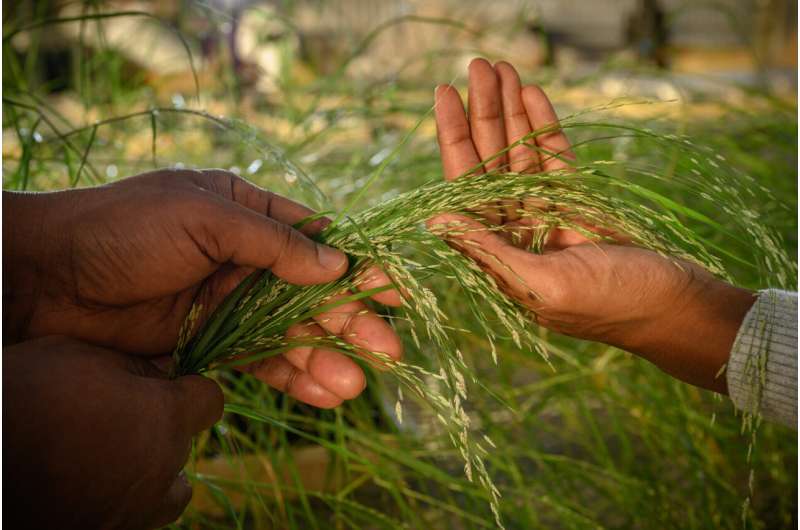This article has been reviewed according to Science X's editorial process and policies. Editors have highlighted the following attributes while ensuring the content's credibility:
fact-checked
peer-reviewed publication
trusted source
proofread
Gluten-free African grain teff shows antioxidant activity in human cells

Teff, a gluten-free grain historically grown in East Africa but increasingly available in the United States, seems to have antioxidant properties in human cells, say UNC Greensboro (UNCG) researchers. Their study, which examined the effects of Eragrostis teff extracts on human cells, was published in Antioxidants.
The researchers found that teff (also spelled "tef") increased levels of glutathione—an antioxidant molecule with several roles in the human body—and gene expression related to glutathione pathways. Furthermore, in a comparison of ivory and brown varieties of teff, brown teff produced higher glutathione levels.
Antioxidants neutralize unstable molecules in the body thus reducing damage to cells, and diets rich in antioxidant activity are linked to health benefits including reduced risk for cardiovascular disease and cancer.
"There are previous reports of teff antioxidant activity in vitro, but there has not been any research using physiologically relevant cell models," said UNCG biologist Dr. Ayalew Ligaba Osena, whose lab led the study. "Human cell models are more relevant to our health. Our study used a line of human leukemia monocytic cells known as THP-1, which are widely used in disease studies."
Osena's lab is now analyzing 85 types of brown teff, with the goal of identifying varieties with the highest antioxidant properties.
"We are finding some promising varieties," Osena said. "We plan to isolate genes regulating increased antioxidant activity in teff that can be used to engineer antioxidant properties in teff and other crops such as rice."
Broadly, he says, this line of research is particularly relevant for people who are seeking nutritious, gluten-free grains. Teff is currently grown in the U.S. as a forage crop, and specialty stores import the flour for human consumption. Osena expects consumption to increase in tandem with gluten-free diets.
The published study, which involved expertise in plant molecular biology, chemistry, and molecular toxicology, arose from a partnership between Osena's lab and the labs of Dr. Zhenquan Jia and Dr. Nicholas Oberlies at UNCG. "It increased our productivity and provided many opportunities for undergraduate and graduate student involvement."
Two authors on the paper contributed as undergraduate-level student researchers. First author Christopher Cotter worked in the Osena lab as a postbaccalaureate student and is now pursuing his doctorate at the University of Tennessee, Knoxville.
"Being able to have my work and name on a publication as a young, hopeful scientist is a huge opportunity," said student co-author Eric Whisnant, who is currently a postbaccalaureate in the Osena lab pursuing a bachelor's degree in biology with a minor in chemistry.
Whisnant, who already holds a UNCG bachelor's degree in marketing and finance with a minor in philosophy, ultimately plans to pursue a doctorate in biology. He says his experience working on multiple teff studies in Osena's laboratory, supported in part by a UNCG Undergraduate Research and Creativity Award, has been invaluable as a source of practical experience to prepare him for his next steps in graduate school.
For Osena, who grew up on an Ethiopian farm where he raised and regularly ate teff, the long-term goal is to develop technologies that will help farmers.
"I aim to understand the genetics behind teff's desirable traits, including nutritional quality, antioxidant properties, and abiotic stress resilience," Osena says. "If we come up with significant discoveries, we can take them to the field to benefit teff producers here in the U.S. and Africa"
More information: Christopher J. Cotter et al, Evaluating the Antioxidant Properties of the Ancient-Crop Tef (Eragrostis tef) Grain Extracts in THP-1 Monocytes, Antioxidants (2023). DOI: 10.3390/antiox12081561
Journal information: Antioxidants
Provided by University of North Carolina at Greensboro




















